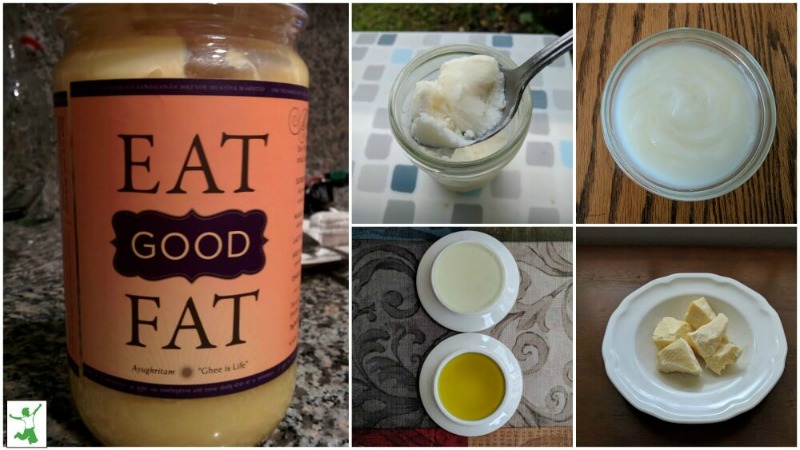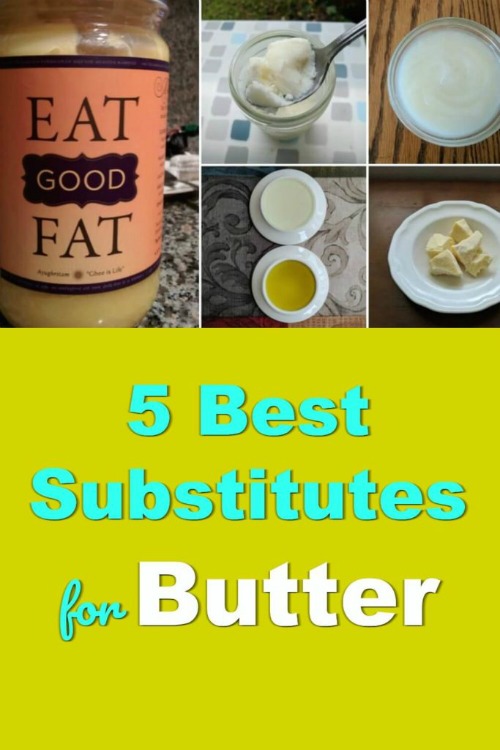
A small but still sizable percentage of people today are unable to eat butter. Typically, the reasons are due to a dairy allergy or restrictive food philosophy. This is a shame considering that butter, especially if from grazing animals, is one of the most nutrient-rich and affordable traditional foods. The reassuring news is that there are five excellent substitutes for butter that are great tasting and whole-food based.
There is no need to settle for butter substitutes made from rancid or even genetically modified fats! Just say no to whipped butter blends and other cheap, mass-produced vegetable oil-based spreads like “Smart” Balance!
The Healthiest Butter Substitute
By far, the most nutritious and best butter substitute is ghee.
Ghee, or clarified butter, has been used for thousands of years by Indian cultures. In fact, traces of ghee have been found on fragments of Indian pottery dating as far back as 6500 BC!
In these cultures, ghee served as a very important source of the elusive yet critical MK-4 version of vitamin K2. No plant-based butter substitute contains this nutrient.
The vast majority of people allergic to butter can eat ghee with no problem. The reason is that the process of clarifying butter by heating removes all of the proteins with only pure fat remaining.
This means that ghee is shelf stable as well as non-allergenic. Unlike butter, ghee does not need refrigeration and keeps well on the counter or pantry for many months.
When raw butter is clarified by centrifuge without any heat, the resulting fat is called butter oil.
Butter oil is even easier to digest than ghee because all the enzymes and probiotics are intact.
Ghee is perfect for all occasions where you would typically use butter from spreading on toast to baking cookies.
Coconut Butter
Coconut butter goes by a number of names including coconut manna and coconut spread.
The most nutritious coconut butter is made from 100% organic, raw coconut meat. It is perhaps the most affordable and best vegan butter substitute.
Manufacturing involves rapidly dehydrating, pulverizing and then grinding the coconut meat at temperatures below 103 °F/ 36 °C to preserve all enzymes, nutrients, and probiotics.
Absolutely nothing should ever be added to pure coconut butter!
While coconut oil melts at 76 °F/ 24 °C, coconut butter usually maintains a delectable spreadable consistency throughout the year in your pantry.
Like some nut butters, the oil in the coconut spread will naturally rise to the top of the jar over time. If you keep it quite cool in your home, lightly warm the jar in a bowl of warm water and then stir with a knife to reblend.
Coconut butter is best reserved for spreadable uses or adding to smoothies. The texture is not as suitable for baking as ghee. If you need a coconut-based baking substitute for butter, expeller pressed coconut oil imparts incredible moistness, especially for cookies and cakes.
Cocoa (Cacao) Butter
When many people think of cocoa butter, they think of skincare products, particularly those crafted for use in the sun. However, this rich aromatic fat makes an excellent plant-based butter substitute too.
Even if you are avoiding cocoa powder or chocolate in general, cocoa butter is still safe to use. It has a warm, chocolate aroma free of caffeine and other irritating substances.
The difference between cocoa butter and cacao butter is simply that one comes from roasted beans and the other from raw beans.
Both cocoa and cacao butter are quite expensive. Thus, they are best reserved for making candies and other sweets where small amounts are required. In my home, cacao butter is a key ingredient in my homemade chocolate sauce recipe.
Coconut Ghee
Another whole food-based butter substitute is coconut ghee.
With coconut oil one of the most beneficial plant-based oils and ghee a potent, low allergen, highly nutritious animal-sourced fat, it would seem logical that combining them would be a boon in the kitchen.
Using this oil blend works beautifully for sauteing, frying up pancakes, cooking vegetables, and stir-frying. Higher heat uses such as grilled cheese sandwiches work too. Blending the ghee with coconut oil increases its smoke point. The resulting heat resistance of the blended oil is higher than coconut oil alone.
You can either buy coconut ghee for convenience or make it yourself by blending warmed, liquified ghee and coconut oil together 50-50 in a large mason jar. Using a stick blender seems to work the best and make the least mess.
If you would prefer no coconut flavor to your coconut ghee, use expeller-pressed coconut oil instead of virgin.
Palm Shortening
Palm shortening makes a very good butter substitute, but for baking only. It has little to no taste, hence it is not as delectable as the other substitutes for butter described above.
Note that palm shortening is also known as palm fruit oil because it is derived from the fleshy part of the palm fruit.
Palm kernel oil is derived from the hard and innermost, nutlike core of the palm fruit. However, this oil is more expensive and not typically used to make palm shortening.
There is a downside to both forms of palm oil and that is the issue of sustainability. Deforestation to make way for palm plantations has resulted in a substantial loss of habitat for orangutans in locations such as Borneo.
As a result, it is important to only support companies that produce sustainable palm oil.
This vetted quality brand blends virgin coconut oil and red palm oil without any additives, fillers, GMOs or destructive manufacturing.
 Tips When Substituting Oil for Butter
Tips When Substituting Oil for Butter
If you wish to use your favorite oil instead of butter in baking or cooking, the substitution may or may not be 1:1.
For example, if a recipe calls for 1 cup of butter, you would use only 3/4 cup of oil. This is because butter has less density than oil.
However, if that same recipe calls for 1 cup of melted butter, then you would substitute a full cup of oil.
Which of these five butter substitutes do you use in your home? What is your favorite go-to substitute for butter?








Is using butter in baking healthy?
Ghee is wonderful, but in a kosher keeping world (my primary reason for sometimes avoiding butter), ghee doesn’t work as a butter substitute, since it is still, very clearly a dairy product. My go-to baking replacers are oil, coconut oil (which I don’t love because I HATE coconut and I’m also mildly allergic). I’ve never tried Palm Shortening (though I’ve certainly used regular shortening in pie crusts on occasion), so I’ll give that a try. Thanks for the suggestions.
I’ll admit to occasionally having used Stupid Balance, but I don’t care for it. My husband and kids do though. (We are having a disagreement I’m hoping you can resolve: is Smart Balance considered “margarine”? One of my daughters won’t eat margarine, but she happily slathers smart balance on her challah bread. We’ve tried telling her it’s margarine and she says it isn’t; it’s a “buttery spread.”
Not only dairy-intolerant people cannot/shouldn’t consume butter, but the 20+% of the population that has the ApoE3/4 or ApoE4/4 gene. With this population, it really is saturated fat that is bad. Out of the above substitutions, only palm oil (not palm kernel oil) is a safe replacement. For our ApoE-er, we have had to come to rely on the daily use of olive, and avocado oils; and occasional use of palm oil and smaltz.
I buy cultured raw butter. I put a stick on the counter for use and store the rest in the fridge. Or should I put all four sticks in the fridge?
I tend to use a variety of healthy fats depending on what I’m eating or cooking. I don’t bake much (sugar), so I seldom use shortening. Lard for omelets, scrambled eggs when I want the slight pork flavor. Tallow, ghee, duck fat for frying/sauteeing/roasting vegetables. EVOO on salads (no heat), tahini or butter with cinamon on sweet potato. Bacon grease sparingly.
Ghee is still prone to allergic issue if you are lactose intolerance, exception is there if provided your are using lactose free butter/milk to make Ghee, Yes it is good in taste I liked it very much in India but issue start happening with me when I moved to north America. I will try coconut products.
I’ve used some coconut products as you mentioned when eating fresh fruit but my favorite butter substitute is duck fat because it’s consistency is very similar to butter/ghee. Duck fat also has a mild taste in my opinion. I only use it for baking or to spread fresh on baked veggies, etc. like I would butter. Great for dairy-free eaters like my family for now! I hope we can all enjoy butter again one day. I’m always surprised to see that duck fast is not mentioned in dairy-free substitutes but maybe because it’s harder to find for most people and so not used often.
Thanks, didn’t know that about Ghee I’ll try a little see how it goes.
I have followed the teachings of The WAPF for year.I have always agreed with what you shared. Recently I’ve read thoughts stating that all fat clogs the liver and makes it less efficient in clearing the body of toxins and functions related to blood sugar handling etc. They make their claims sound very convincing! What would you say to these people? My husband has type 2 diabetes and I’m confused about what the best diet is for him.
Fat doesn’t “clog” the liver. The liver makes bile to digest fat! Some types of fat are bad for health and contribute to inflammation and others are very good. So many articles on this site to help clear things up for you. https://www.thehealthyhomeeconomist.com/healthy-fats/
Hey Sarah, I’m surprised you didn’t list lard or tallow. They are great cooking fats!
Yes, these two fats are very traditional and healthy! However, I don’t really consider them butter substitutes because they are primarily used for frying (and lard for pie crusts of course). Butter isn’t used for frying because it easily burns. Butter is more for spreading on toast, light veggie sautes or for baking, so I chose substitutes that worked the best for these purposes.
I’m interested to see what other people use!